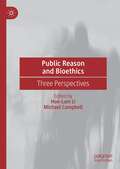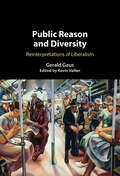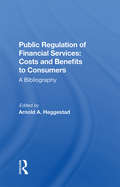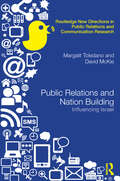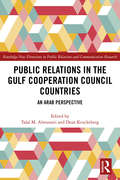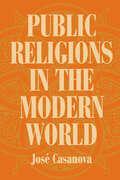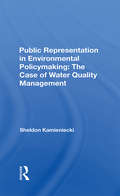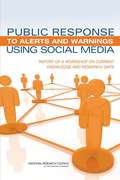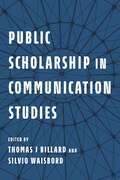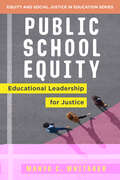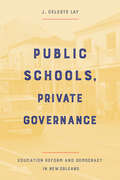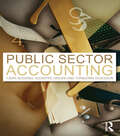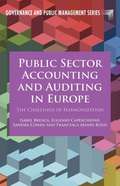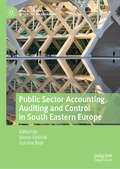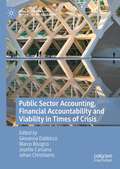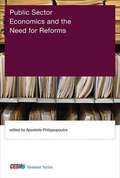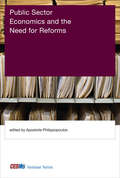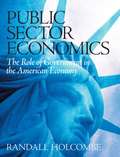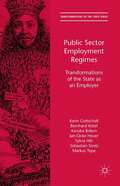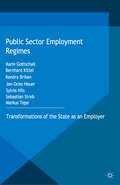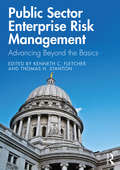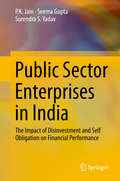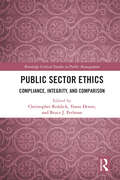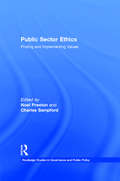- Table View
- List View
Public Reason and Bioethics: Three Perspectives
by Michael Campbell Hon-Lam LiThis book explores and elaborates three theories of public reason, drawn from Rawlsian political liberalism, natural law theory, and Confucianism. Drawing together academics from these separate approaches, the volume explores how the three theories critique each other, as well as how each one brings its theoretical arsenal to bear on the urgent contemporary debate of medical assistance in dying. The volume is structured in two parts: an exploration of the three traditions, followed by an in-depth overview of the conceptual and historical background. In Part I, the three comprehensive opening chapters are supplemented by six dynamic chapters in dialogue with each other, each author responding to the other two traditions, and subsequently reflecting on the possible deficiencies of their own theories. The chapters in Part II cover a broad range of subjects, from an overview of the history of bioethics to the nature of autonomy and its status as a moral and political value. In its entirety, the volume provides a vibrant and exemplary collaborative resource to scholars interested in the role of public reason and its relevance in bioethical debate.
Public Reason and Diversity: Reinterpretations of Liberalism
by Gerald GausGerald Gaus was one of the leading liberal theorists of the late twentieth and early twenty-first centuries. He developed a pioneering defence of the liberal order based on its unique capacity to handle diversity and disagreement, and he presses the liberal tradition towards a principled openness to pluralism and diversity. This book brings together Gaus's most seminal and creative essays in a single volume for the first time. It also covers a broad span of his career, including essays published shortly before his death, and topics including reasonable pluralism, moral rights, public reason, and the redistributive state. The volume makes accessible the work of one of the most important recent liberal theorists. Many readers will find it of value, especially those in political philosophy, political science, and economics.
Public Regulation of Financial Services: Costs and Benefits to Consumers
by Arnold A. Heggestad Arnold A Heggestad Sr AnalystIn the many studies that have been conducted on the provision of financial services for consumers, regulation has emerged as one of the most important factors. The impact of regulation on financial service industries is a major focus of this comprehensive bibliography of relevant source materials in the field of regulatory economics. The bibliography includes entries from the major economics and finance journals published over the past twenty years, major law and business journals,government documents, books, and doctoral dissertations--all indexed according to subject matter--as well as abstracts of many of the papers.The product of extensive research, Heggestad's work is invaluable to university libraries, regulatory agencies, financial institutions, and financial experts, and is an efficient and essential reference tool for anyone wishing to study specific markets and the impact of financial regulation on them.
Public Relations and Nation Building: Influencing Israel (Routledge New Directions in PR & Communication Research)
by David McKie Margalit ToledanoAll public relations emerges from particular environments, but the specific conditions of Israel offer an exceptional study of the accelerators and inhibitors of professional development in the history of a nation. Documenting and analyzing the contribution of one profession to building one specific nation, this book tells the previously-untold story of Israeli public relations practitioners. It illustrates their often-unseen, often-unacknowledged and often-strategic shaping of the events, narratives and symbols of Israel over time and their promotion of Israel to the world. It links the profession’s genesis – including the role of the Diaspora and early Zionist activists – to today’s private and public sector professionals by identifying their roots in Israel’s cultural, economic, media, political, and social systems. It reveals how professional communicators and leaders nurtured and valued collectivism, high consensus, solidarity, and unity over democracy and free speech. It investigates such key underpinning concepts as Hasbara and criticizes non-democratic and sometimes unethical propaganda practices. It highlights unprecedented fundraising and lobbying campaigns that forged Israeli identity internally and internationally. In situating Israeli ideas on democracy in the context of contemporary public relations theory, Public Relations and Nation Building seeks to point ways forward for that theory, for Israel and for the public relations of many other nations.
Public Relations in the Gulf Cooperation Council Countries: An Arab Perspective (Routledge New Directions in PR & Communication Research)
by Dean Kruckeberg Talal M AlmutairiThe Arab world has engaged in public relations for thousands of years, and the public relations literature provides multiple examples extending from ancient times. However, modern public relations is much more vaguely defined. This is partly because the research surrounding public relations practice in the Middle East remains sparse, especially in the Gulf Cooperation Council (GCC) countries. <P><P>This book presents a clear picture of contemporary PR practice in this region, providing a background on the evolution of public relations in each GCC country. It shows how environmental factors (historical, cultural, socio-political, and economic) influence practice in the region. It also contributes to public relations scholarship, education, and practice worldwide by providing new perspectives to those unfamiliar with its practice in this region. <P><P>This book will benefit scholars and practitioners alike through its informed analysis of the strengths and weaknesses of practice in the GCC countries, as well as being of great benefit to the development of professional practice in the region.
Public Religions in the Modern World
by José CasanovaIn a sweeping reconsideration of the relation between religion and modernity, Jose Casanova surveys the roles that religions may play in the public sphere of modern societies. During the 1980s, religious traditions around the world, from Islamic fundamentalism to Catholic liberation theology, began making their way, often forcefully, out of the private sphere and into public life, causing the "deprivatization" of religion in contemporary life. No longer content merely to administer pastoral care to individual souls, religious institutions are challenging dominant political and social forces, raising questions about the claims of entities such as nations and markets to be "value neutral", and straining the traditional connections of private and public morality. Casanova looks at five cases from two religious traditions (Catholicism and Protestantism) in four countries (Spain, Poland, Brazil, and the United States). These cases challenge postwar—and indeed post-Enlightenment—assumptions about the role of modernity and secularization in religious movements throughout the world. This book expands our understanding of the increasingly significant role religion plays in the ongoing construction of the modern world.
Public Representation In Environmental Policymaking: The Case Of Water Quality Management
by Sheldon KamienieckiRelying on the results of a large survey research project in western New York State, the author compares the environmental planning beliefs of public officials and citizens. His major finding is that, although leaders involved in water quality planning projects and the public share similar views on environmental issues, these leaders are by far the worst predictors of citizens' views. Professor Kamieniecki's systematic probing of the determinants that make some officials more adept than others at accurate calculation of public preference uncovers imbalanced public representation due to several factors. He concludes with an evaluation of citizen participatory mechanisms and consequent recommendations designed to elicit a wide range of public opinion, a prerequisite for acceptable environmental planning.
Public Response to Alerts and Warnings Using Social Media
by National Research Council Computer Science and Telecommunications Board Division on Engineering and Physical Sciences Committee on Public Response to Alerts and Warnings Using Social Media: Current Knowledge and Research GapsFollowing an earlier NRC workshop on public response to alerts and warnings delivered to mobile devices, a related workshop was held on February 28 and 29, 2012 to look at the role of social media in disaster response. This was one of the first workshops convened to look systematically at the use of social media for alerts and warnings--an event that brought together social science researchers, technologists, emergency management professionals, and other experts on how the public and emergency managers use social media in disasters.In addition to exploring how officials monitor social media, as well as the resulting privacy considerations, the workshop focused on such topics as: what is known about how the public responds to alerts and warnings; the implications of what is known about such public responses for the use of social media to provide alerts and warnings to the public; and approaches to enhancing the situational awareness of emergency managers. Public Response to Alerts and Warnings Using Social Media: Report of a Workshop on Current Knowledge and Research Gaps summarizes presentations made by invited speakers, other remarks by workshop participants, and discussions during parallel breakout sessions. It also points to potential topics for future research, as well as possible areas for future research investment, and it describes some of the challenges facing disaster managers who are seeking to incorporate social media into regular practice.
Public Scholarship in Communication Studies
by Larry Gross Silvio Waisbord Chad Raphael Sue Robinson Aymar Jean Christian Holley Wilkin Amy Jordan Susan Mancino Daniel Kreiss Srividya Ramasubramanian Paula Gardner Philip M Napoli Thomas J. Billard Rachel Kuo Yidong Wang Elaine Almeida Stacey L Connaughton Shannon C McGregor Danielle K Brown Todd P Newman Becca BeetsPrometheus brought the gift of enlightenment to humanity and suffered for his benevolence. This collection takes on scholars’ Promethean view of themselves as selfless bringers of light and instead offers a new vision of public scholarship as service to society. Thomas J Billard and Silvio Waisbord curate essays from a wide range of specialties within the study of communication. Aimed at scholars and students alike, the contributors use approaches from critical meditations to case studies to how-to guides as they explore the possibilities of seeing shared knowledge not as a gift to be granted but as an imperative urging readers to address the problems of the world. Throughout the volume, the works show that a pivot to ideas of scholarship as public service is already underway in corners of communication studies across the country. Visionary and provocative, Public Scholarship in Communication Studies proposes a needed reconsideration of knowledge and a roadmap to its integration with community. Contributors: Elaine Almeida, Becca Beets, Thomas J Billard, Danielle K. Brown, Aymar Jean Christian, Stacey L. Connaughton, Paula Gardner, Larry Gross, Amy Jordan, Daniel Kreiss, Rachel Kuo, Susan Mancino, Shannon C. McGregor, Philip M. Napoli, Todd P. Newman, Srividya Ramasubramanian, Chad Raphael, Sue Robinson, Silvio Waisbord, Yidong Wang, and Holley Wilkin
Public School Equity: Educational Leadership for Justice (Equity and Social Justice in Education #0)
by Manya WhitakerEquality is not equity, tolerance is not inclusion, and access is not opportunity. Efforts to address inequities within our schools tend to ignore the underlying beliefs that sustain injustices, and focus instead on short-lived policies and practices. This book takes a different approach to eradicating educational disparities. Drawing on more than forty interviews with teachers, principals, and district leaders, Manya C. Whitaker offers educators guidance for leading a school or district grounded in social justice that centers teachers—not just teaching practices—and that focuses on the belief systems that shape decision-making. The chapters walk educational leaders through a strategic approach to long-term change: from school planning for family and community engagement, to hiring and onboarding teachers, to sustaining equity through multifaceted professional development and equitable evaluation. Concrete “how-to”s are provided throughout, along with reflection questions to help readers apply the content to their context. For any school or district leader intent on addressing the many inequities highlighted by the COVID-19 pandemic, this book is an essential manual.
Public Schools, Private Governance: Education Reform and Democracy in New Orleans
by J. Celeste LayTwo months after Hurricane Katrina, Louisiana took control of nearly all the public schools in New Orleans. Today, all of the city’s public schools are charter schools. Although many analyses mark the beginning of education reform in New Orleans with Katrina, in Public Schools, Private Governance, J. Celeste Layargues that the storm merely accelerated the timeline for reforms that had inched along incrementally over the previous decade. Both before and after Katrina, white reformers purposely excluded Black educators, community members, and parents. Public Schools, Private Governance traces the slow, deliberate dismantling of New Orleans’ public schools, and the processes that have maintained the reforms made in Katrina’s immediate aftermath, showing how Black parents and residents were left without a voice and the officials charged with school governance, most of whom are white, with little accountability. Lay cogently explains how political minorities disrupted systems to create change and keep reforms in place, and the predictable political effects—exclusion, frustration, and resignation—on the part of those most directly affected.
Public Sector Accounting
by Tjerk Budding Giuseppe Grossi Torbjörn TagessonAs change sweeps across the public sector, a huge range of accounting and financial management challenges are created. This textbook analyses the reforms that are being introduced to deal with these challenges and their global impact on the public sector. Readers are provided with an international overview of government accounting, reporting, management control, cost accounting, budgeting and auditing. In explaining how innovative financial management tools are utilized in the public sector, the authors address a number of emerging issues: Harmonization trends in public financial management and International Public Sector Accounting Standards (IPSASs) Financial reporting and consolidated financial statements in the public sector Public sector management accounting and control methods Financial and performance auditing in the public sector This concise and accessible textbook will be core reading for public sector accounting and financial management students and will also be required reading for students of public management and administration more generally. Managers, accountants, consultants and auditors working in the public sector will also find the book a useful reference.
Public Sector Accounting and Auditing in Europe
by Isabel Brusca Eugenio Caperchione Sandra Cohen Francesca Manes RossiThe accounting systems of all levels of government in Europe have undergone substantial changes during the last 20 years, which have not always been communicated outside country boundaries in a timely manner. This book addresses that shortcoming. With contributions by 25 leading researchers, it discusses in detail the governmental accounting status quo in 14 European countries. The book presents in a concise, thorough and comprehensive way the public sector accounting, budgeting and auditing systems at all levels of government, followed by a comparative analysis of the governmental accounting systems discussed. It also sheds light on the challenges that are likely to be faced by European countries as they move towards adopting the European Public Sector Accounting Standards (EPSAS), and offers a valuable reference resource for academics, researchers, students, auditors, public administrators and policy makers.
Public Sector Accounting, Auditing and Control in South Eastern Europe (Public Sector Financial Management)
by Vesna Vašiček Gorana RojeThis book comprehensively presents the current practice and further development paths of public sector accounting, auditing and control systems in 7 South Eastern European countries based on the contributions of highly-respected researchers. Each chapter is a study of the territorial organisation, public sector scope, formulation and execution of central government and local and regional self-government budgets, accounting and financial reporting reforms and practice, audit and other oversight (supervision) in the public sector, and challenges in the further development of public sector accounting and auditing of each country. It also provides insights into the challenges that SEE countries are faced with as they move towards the adoption of accrual accounting and the implementation of IPSAS and/or EPSAS, and offers a valuable reference resource for academics, researchers, students, auditors, public administrators, policy makers and standard setters.
Public Sector Accounting, Financial Accountability and Viability in Times of Crisis (Public Sector Financial Management)
by Josette Caruana Giovanna Dabbicco Marco Bisogno Johan ChristiaensThis book examines the implications of the Covid-19 pandemic for public-sector accounting and finance. It provides a holistic overview of government initiatives to navigate the pandemic, focusing on how government policies and related spending have affected the budgetary process, the disclosure of information and transparency, as well as the importance of accounting technologies and operating systems in times of crisis. The book shows how government economic interventions have been crucial in counteracting the financial consequences of the global pandemic, and emphasizes the importance of accountability. It will appeal to students and scholars of public policy, public administration and finance, as well as policymakers and public managers responsible for public sector financial and budgetary reporting of public administrations.
Public Sector Criminological Research: The Australian Institute of Criminology, 1972–2022
by Russell G. SmithThis book explores the role and development of criminological research in the public sector during the last half-century. It identifies the benefits such research has provided and assesses whether the community has received value for the funds expended. The Australian Institute of Criminology is used as a case study to illustrate the challenges and pressures facing those who have sought to carry out independent crime and justice research in the public sector, to assess what fifty years of work has achieved and to determine whether or not there remains a need for criminologists to be employed by governments. The book is based on extensive archival research, administrative data analysis, interviews with current and previous staff and the perspectives of scholars in comparable institutions globally. It presents new historical information as well as current and future critical perspectives on crime and justice research in a unique Australian government organization.
Public Sector Economics and the Need for Reforms
by Apostolis PhilippopoulosThe public sector has grown substantially in the last fifty years. In the euro area, for example, total government expenditures have been around fifty percent of GDP since the early 2000s, resulting in a growing tax burden or high public debt or both. At the same time, government had intervened in all aspects of economic life, from the provision of public goods and services to product and labor market regulation. Research shows that the effect of government size on economic performance is positive in countries where the public sector is efficient but negative in countries where it is inefficient. In this book, experts from academe and central banking discuss reforms that would make the public sector more efficient and/or more equitable. After a rich review of the public sector reform policy agenda, with particular attention to the role of the public sector and how to improve the provision of public goods and services, the contributors offer theoretically and empirically informed perspectives on some specific policy topics. These include public wage and employment policy, the role of international institutions such as the World Bank in promoting public sector reforms, the optimal mix of tax policy, the measurement of public sector efficiency, and the study of fiscal sustainability. The contributors relate these topics to such deeper issues as individual incentives as well as to policy debates over privatization, and austerity. ContributorsKonstantinos Angelopoulos, Stylianos Asimakopoulos, Danilo Ballanti, Roberto A. De Santis, Roberto Dispotico, George Economides, Pedro Gomes, Gabriella Legrenzi, James Malley, Costas Milas, Ilaria Petrarca, Apostolis Philippopoulos, Francesco Porcelli, Roberto Ricciuti, Lodewijk Smets, Peter Birch Sørensen, Petros Varthalitis, Francesco Vidoli
Public Sector Economics and the Need for Reforms (CESifo Seminar Series)
by Apostolis PhilippopoulosTheoretically and empirically informed studies on the role and efficiency of the public sector, public wage and employment policy, privatization, tax policy, and fiscal sustainability.The public sector has grown substantially in the last fifty years. In the euro area, for example, total government expenditures have been around fifty percent of GDP since the early 2000s, resulting in a growing tax burden or high public debt or both. At the same time, government had intervened in all aspects of economic life, from the provision of public goods and services to product and labor market regulation. Research shows that the effect of government size on economic performance is positive in countries where the public sector is efficient but negative in countries where it is inefficient. In this book, experts from academe and central banking discuss reforms that would make the public sector more efficient and/or more equitable. After a rich review of the public sector reform policy agenda, with particular attention to the role of the public sector and how to improve the provision of public goods and services, the contributors offer theoretically and empirically informed perspectives on some specific policy topics. These include public wage and employment policy, the role of international institutions such as the World Bank in promoting public sector reforms, the optimal mix of tax policy, the measurement of public sector efficiency, and the study of fiscal sustainability. The contributors relate these topics to such deeper issues as individual incentives as well as to policy debates over privatization, and austerity. ContributorsKonstantinos Angelopoulos, Stylianos Asimakopoulos, Danilo Ballanti, Roberto A. De Santis, Roberto Dispotico, George Economides, Pedro Gomes, Gabriella Legrenzi, James Malley, Costas Milas, Ilaria Petrarca, Apostolis Philippopoulos, Francesco Porcelli, Roberto Ricciuti, Lodewijk Smets, Peter Birch Sørensen, Petros Varthalitis, Francesco Vidoli
Public Sector Economics: The Role of Government in the American Economy
by Randall G. HolcombeThis book attempts to integrate the study of the various aspects of public sector economics by viewing all the government's activities as a product of the democratic decision-making process.
Public Sector Employment Regimes: Transformations of the State as an Employer (Transformations of the State)
by Bernhard Kittel Kendra Briken Markus Tepe Karin Gottschall Jan-Ocko Heuer Sylvia Hils Sebastian StrebPublic Sector Employment Regimes.
Public Sector Employment Regimes: Transformations of the State as an Employer (Transformations of the State)
by Bernhard Kittel Kendra Briken Markus Tepe Karin Gottschall Jan-Ocko Heuer Sylvia Hils Sebastian StrebThis book explores the extent to which a transformation of public employment regimes has taken place in four Western countries, and the factors influencing the pathways of reform. It demonstrates how public employment regimes have unravelled in different domains of public service, contesting the idea that the state remains a 'model' employer.
Public Sector Enterprise Risk Management: Advancing Beyond the Basics
by Kenneth C. Fletcher Thomas H. StantonThrough a series of case studies and selected special topics, Public Sector Enterprise Risk Management presents examples from leading Enterprise Risk Management (ERM) programs on overcoming bureaucratic obstacles, developing a positive risk culture, and making ERM a valuable part of day-to-day management. Specifically designed to help government risk managers, with concepts and approaches to help them advance risk management beyond the basics, the book: Provides a balanced mix of concepts, instruction and examples; Addresses topics that go beyond the basics of Enterprise Risk Management (ERM) program design and implementation; Includes insights from leading practitioners and other senior officials. Many government organizations can refer to the growing body of materials that provide examples of ERM processes and procedures. Far fewer reference materials and examples exist to help organizations develop a risk-mature organizational culture that is critical to the long-term success and strategic value that ERM represents to government organizations. Public Sector Enterprise Risk Management begins to fill that void and is intended to help public sector risk managers overcome barriers that inhibit ERM from becoming an active contributor to major decisions that top officials must make.
Public Sector Enterprises in India
by P. K. Jain Seema Gupta Surendra S. YadavThe book examines the various aspects of non-financial central public sector enterprises (PSEs) in India, for a period from 1986-87 to 2010-11. The analysis is based on all the key financial ratios; namely, profitability, efficiency, liquidity, leverage and productivity. Liberalization and globalization have caused competition in India and have lowered the profit margins. At the same time, Indian government has reduced subsidies and budgetary support for PSEs to curtail their own fiscal deficit. Strategic and economic reforms were also introduced in PSEs to make their operations commercially profitable so that they are not dependent on the government to meet their financial requirements on the one hand, and have their own earnings to finance their expansion/modernization requirements as well as their social obligations, on the other. To what extent, the PSEs have succeeded in this objective constitutes one major aspect of the present research work. The other equally important aspect examined is financial performance of the PSEs which have opted for disinvestment and have signed memorandum of understanding (MoU)/ self obligations. The Indian Government has desired the central PSEs to be profitable in their operations in post-liberation era of 1990s. For this purpose, two major instruments, namely, disinvestment and MoUs, were introduced. This book examines, in detail, financial performance of PSEs which had opted for disinvestment and have signed MoU. Based on analysis/ findings and literature on the subject, the book contains some concrete suggestions that would prove extremely helpful to Indian Government to further improve their financial performance.
Public Sector Ethics: Compliance, Integrity, and Comparison (Routledge Critical Studies in Public Management)
by Christopher Reddick Tansu Demir Bruce J. PerlmanPublic Sector Ethics: Compliance, Integrity, and Comparison presents a comprehensive treatment of the subject of ethics in the public sector. What structural elements are necessary and how to create organizations that make ethics their priority are the questions that this edited book addresses. It focuses on ethics management in public organizations and includes national case studies from select low- to middle-income countries.Taken together, the chapters in this book cover the mechanisms, activities, and approaches that public organizations employ in ethics management. These are of utmost importance because the actions of public organizations affect citizens’ lives, liberties, and property, and their ethical character affects citizens’ faith in government. Numerous factors are at play in each instance of ethics management in public organizations, and controlling ethical behavior is difficult. This book suggests that effective ethics management requires a comprehensive approach. Traditional approaches such as ethics codes, policies and legislation, training, incentives, sanctions, monitoring, and compliance reviews are tools to achieve ethical conformity. Yet, they are effective only if leadership, values, and cultural transformation support them. This edited volume is a cohesive treatment of the subject, covering traditional approaches to ethics management, such as monitoring and compliance, and more contemporary approaches, like integrity building through ethical leadership and organizational values, as well as how to skillfully and effectively combine them to change organizational ethical contexts.This book exposes readers to new approaches and emerging issues in public sector ethics, aids in understanding the challenges of creating ethical organizations, and helps to develop a deeper understanding of ethics management in government organizations. It will be of interest to researchers, academics, and advanced students in the fields of business ethics, public administration and management, leadership, and organizational studies.
Public Sector Ethics: Finding and Implementing Values (Routledge Studies in Governance and Public Policy #Vol. 1)
by Charles Sampford Noel Preston C-A BoisThis study, with contributions from both scholars and practitioners, examines the theory and practice of public sector ethics across a broad range of environments.
